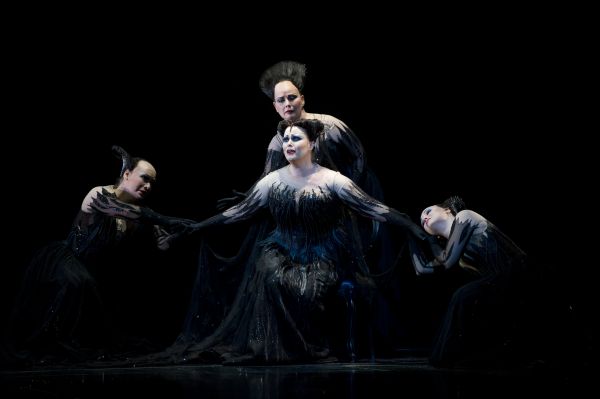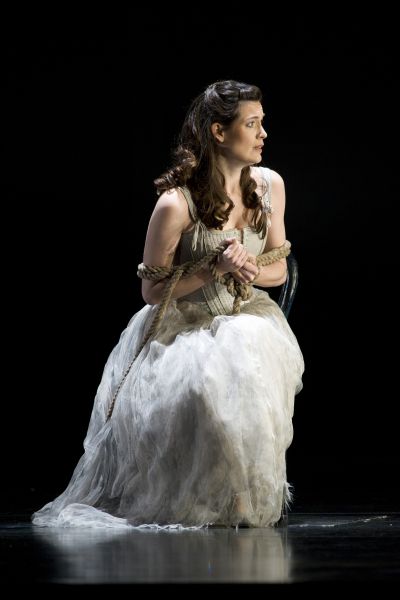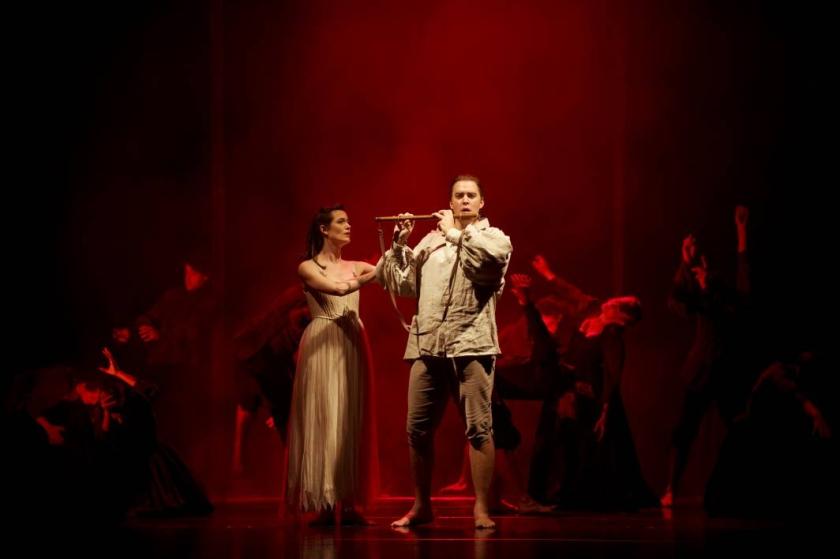“Tumult and peace, the darkness and the light – were all like workings of one mind.” Writing almost a century after Mozart’s Die Zauberflöte, Wordsworth was still contemplating the essential duality of the sublime – that greatest of Enlightenment legacies. Rationalism, order and science, we are reminded, are only the admissible part of an age that would also beget the sinister fantasies of Romanticism and the Gothic – those most pernicious of bastard offspring. It is in exposing this messily contingent relationship between the light of truth and the shadows of superstitious doubt that David McVicar’s Die Zauberflöte still triumphs. As for moving beyond duality into resolution however – we’re still left hanging.
Darkness falls, the Overture’s threefold chord unfurls, releasing the scampering string lines of the Allegro, and suddenly the gloomy aisles and balconies of the Royal Opera are punctured with lights – glowing orbs clutched with awed care. Even on a third viewing, McVicar’s opening still bewitches, not least for the elegant precision with which it dramatises the musical text. In the pit once again, Colin Davis set a pace of control rather than release, risking just a flicker of subversion in the emphatic dissent of the brass’s closing offbeat flourishes.
Uncharacteristically however this pace was not to last, giving way to an Act One that felt perpetually on the back foot, with singers hauled from episode to episode by some rather officious hustling from the orchestra. Act Two did settle, arriving thankfully at “Ach, ich fühl's” in an altogether more accommodating spirit and enabling the evening’s finest moment from Kate Royal, shadow of Margaret Price hovering close by. With such a point of comparison it becomes harder to accept the seeming inevitability of first-night fisticuffs between stage and pit elsewhere; ensembles (the trio of Ladies and Christopher Maltman’s Papageno being repeat offenders) lost a full beat on several occasions, clambering back on board at cadences with ungainly rhythmic contortions.
 Fortunately with John McFarlane’s designs and Paule Constable’s painterly lighting there was plenty to delight the eye when the ear failed. Vertical pillars provide not only the Enlightenment absolutes of Sarastro’s temple, but also cast the shadows and frame the dark corners where Monostatos and his fellows lurk. Exposed to his greedy gaze in Act Two, we saw Royal’s Pamina stretched out asleep as if the heroine of Fuseli’s The Nightmare, with Monostatos himself the incubus gazing boldly out at us.
Fortunately with John McFarlane’s designs and Paule Constable’s painterly lighting there was plenty to delight the eye when the ear failed. Vertical pillars provide not only the Enlightenment absolutes of Sarastro’s temple, but also cast the shadows and frame the dark corners where Monostatos and his fellows lurk. Exposed to his greedy gaze in Act Two, we saw Royal’s Pamina stretched out asleep as if the heroine of Fuseli’s The Nightmare, with Monostatos himself the incubus gazing boldly out at us.
Although dodging racial issues with a white-faced Peter Hoare Monostatos (a character designated by the libretto as black, and rendering him more wicked uncle than would-be rapist, McVicar’s characterisation was balanced by an elegant bit of surtitling, borrowing Prospero’s “This thing of darkness I acknowledge mine” for Sarastro, reworking Monostatos implictly into a rather more interesting Caliban role.
 After a superb performance in the title role of Garsington’s Armida, it was Jessica Pratt (pictured above, making her Royal Opera and role debut as the Queen of the Night) who most intrigued of this new cast. While the vocal power is just about there (though she's no Diana Damrau), it’s not a part that seems to sit naturally for her either dramatically or vocally; both big arias were solid enough, but rather hollow at the top and lacking much by way of murderous rage. By contrast, Royal (pictured left) proved herself once again as an actress, making a wonderfully youthful Pamina alongside Joseph Kaiser's competent Tamino and Christopher Maltman’s Papageno – charmingly weak-willed, but whose easy comedy lacked the pathos of Simon Keenlyside's Feste-esque interpretation. Anna Devin’s Papagena showcased a bright and ringing soprano – one to look out for in the forthcoming Peter Grimes.
After a superb performance in the title role of Garsington’s Armida, it was Jessica Pratt (pictured above, making her Royal Opera and role debut as the Queen of the Night) who most intrigued of this new cast. While the vocal power is just about there (though she's no Diana Damrau), it’s not a part that seems to sit naturally for her either dramatically or vocally; both big arias were solid enough, but rather hollow at the top and lacking much by way of murderous rage. By contrast, Royal (pictured left) proved herself once again as an actress, making a wonderfully youthful Pamina alongside Joseph Kaiser's competent Tamino and Christopher Maltman’s Papageno – charmingly weak-willed, but whose easy comedy lacked the pathos of Simon Keenlyside's Feste-esque interpretation. Anna Devin’s Papagena showcased a bright and ringing soprano – one to look out for in the forthcoming Peter Grimes.
Although perhaps lacking the “religious splendours” that Berlioz so admired in Mozart’s opera - the moral and social questions this production so decoratively sidesteps - David McVicar’s Die Zauberflöte remains an intelligently conceived and charming show. Tableaux of Sarastro’s massed sun-citizens, Tamino’s enchanted animals and the Queen’s embroidered skyscape linger in the eyes, as evocative now as in 2003.
Diana Damrau sings the Queen of the Night's aria in David McVicar's Die Zauberflöte
- Die Zauberflöte at the Royal Opera House until 26 February
- See what's on at the Royal Opera House 2010-11















Add comment